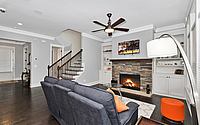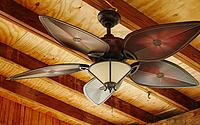Top Things to Consider When Sourcing Ceiling Fans for Your Home
It might be winter right now, and heat may not be an issue, but it will be spring and then summer again before you know it. As such, now is the perfect time to update cooling options in your property, including ceiling fans.
With so many products on the market, though, it can be challenging deciding which options to go with. Here are some top things to consider when sourcing the right fans for your needs.
Budget
You want to have a clear idea of your budget for fan purchases before you start shopping for the products. Knowing what you can and want to spend in this area will help you avoid wasting time looking at options that are too expensive. It will also stop you from being tempted to outlay more than you should.
When creating your budget, don’t just consider the actual goods themselves. Also, keep in mind that you’ll need an electrician or other contractor to install them for you. You may need to pay for shipping, too. Plus, sometimes, there can be a fee for the removal of old products if you’re replacing fans already installed on your ceilings.
Sizing
Sizing is critical too. Avoid making the common mistake of going shopping for fans, whether online or in brick-and-mortar stores, without measuring the ceiling sizes you have available. You also need to know if you’re fitting in more than one fan per room or not. If you buy a single fan and it isn’t big enough for the space, you’ll find it doesn’t move air around as much as necessary and can be a waste of money.
On the other hand, if you choose a fan that’s too big for the room you install it in, you could end up getting a wind tunnel kind of feel and find that it looks too heavy and overpowering visually for the space. It’s crucial to consider height considerations too. If your ceiling is lower than the norm, you may need to buy a low-profile product, while extra-tall roofs typically require more or larger fans.
Critical Factors
Before you go shopping, it helps to write out a list of all the critical factors you’re looking for in the fans you buy. Understand which features are the most important to you so when you compare many options, you’ll know where to focus and where you can and can’t compromise.
For instance, design style is something you’ll want to match with your home’s architecture and your current (or planned if renovating) interior decorating choices. You may be after a warm, wood-look farmhouse ceiling fan for your living area or want a more modern, sleek, chrome product for your office, or perhaps a brightly colored fan for a bedroom. There are many different styles and shades, so think about what will suit room décor best early on.
Other features you may be interested in include “smart” fans that feature not just remotes but also the ability to program them from your phone and set up timers, etc., or those with lights incorporated in them. You may be after the most energy-efficient product possible that has an ENERGY STAR seal or is made from sustainable materials or produced locally, too. Think about these types of elements as you narrow down your selections.
Research
Spend plenty of time researching fans so you can find the best ones for your needs. It may be tempting to go to the store closest to where you live or buy the first fan you see that’s offered at a great deal, but it’s wise to shop around more. Learn about the different brands and how reliable and consistent they are with their products. Ask about warranties, how easy fans are to install, their power usage, the average cost of repairs, maintenance needs, and so on.
Examine Reviews and Testimonials
Lastly, augment your research by examining reviews and testimonials posted online on social media websites, forums, blogs, and elsewhere. Checking out this data will help you get a good feel for how reliable and user-friendly products may be, though remember that nothing ever really gets a 100 percent positive rating.
As you can see, while fans seem like a simple product, it does pay to take your time finding and purchasing new ones for your home. They’re goods you should be able to use for many years, so it’s best to get your purchases right the first time.
- by Matt Watts






